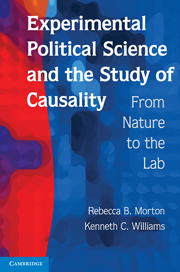Book contents
- Frontmatter
- Contents
- Acknowledgments
- I INTRODUCTION
- II EXPERIMENTAL REASONING ABOUT CAUSALITY
- 2 Experiments and Causal Relations
- 3 The Causal Inference Problem and the Rubin Causal Model
- 4 Controlling Observables and Unobservables
- 5 Randomization and Pseudo-Randomization
- 6 Formal Theory and Causality
- III WHAT MAKES A GOOD EXPERIMENT?
- IV ETHICS
- V CONCLUSION
- References
- Author Index
- Subject Index
3 - The Causal Inference Problem and the Rubin Causal Model
Published online by Cambridge University Press: 05 June 2012
- Frontmatter
- Contents
- Acknowledgments
- I INTRODUCTION
- II EXPERIMENTAL REASONING ABOUT CAUSALITY
- 2 Experiments and Causal Relations
- 3 The Causal Inference Problem and the Rubin Causal Model
- 4 Controlling Observables and Unobservables
- 5 Randomization and Pseudo-Randomization
- 6 Formal Theory and Causality
- III WHAT MAKES A GOOD EXPERIMENT?
- IV ETHICS
- V CONCLUSION
- References
- Author Index
- Subject Index
Summary
In this book we concentrate on two prominent approaches to causality that underpin almost all of the work in political science estimating causal relationships: the Rubin Causal Model (RCM) and the Formal Theory Approach (FTA). In this and the next two chapters, we focus on the RCM model. In Chapter 6 we discuss FTA. RCM is an approach that has its genesis in the statistical literature and early studies of field experiments, whereas FTA comes primarily from the econometric literature and is the approach used by experimental economists in many laboratory experiments (although statisticians such as Pearl [2000] are also advocates of an approach that is similar to FTA).
We begin our presentation of RCM by defining some basic variables and terms used in the approach.
Variables in Modeling the Effects of a Cause
The Treatment Variable
We are interested in the effect of information on how voters choose in the election studied or target population; that is, information is our possible causal variable. To simplify our analysis, we think of being informed as a binary variable (later we discuss analyses where this assumption is relaxed). We can think of there being two states of the world, one in which an individual i is informed about the choices before them in the election and the other in which the individual i is uninformed.
- Type
- Chapter
- Information
- Experimental Political Science and the Study of CausalityFrom Nature to the Lab, pp. 75 - 100Publisher: Cambridge University PressPrint publication year: 2010



